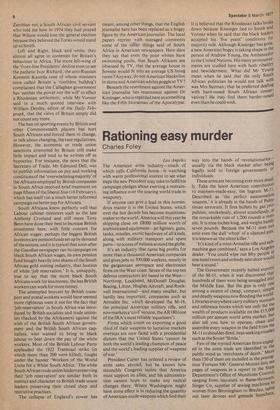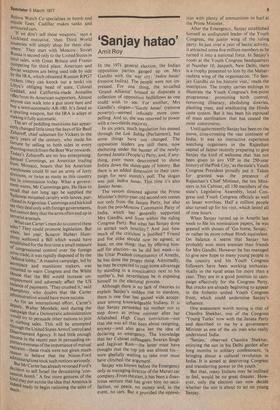Rationing easy murder
Charles Foley
Los Angeles The American arms industry—much of which calls California home—is watching with warm professional interest to see what steps the new President may take to fulfil his campaign pledges about exerting a restraining influence over the soaring world trade in weaponry.
If anyone can give a lead in this horrendous matter it is the United States, which over the last decade has become munitionsmaker to the world. America will this year be shipping close on £8000 million worth of sophisticated equipment—jet fighters, guns, tanks, missiles, exotic hardware of all kinds, along with military transport and spare parts --to scores of nations around the globe.
It's an industry that turns big profits for more than a thousand American companies and gives jobs to 500,000 workers, mostly in the gargantuan aerospace and electronics firms on the West coast. Seven of the top ten defence contractors are based in the West— Northrop, Lockheed, McDonell Douglas, Boeing, Litton, Hughes Aircraft, and Rockwell International—and many smaller, but hardly less important, companies such as Armalite Inc, which developed the M-16, the principal American military rifle, and now markets a `civ version, the A R180 (one of the IRA's most reliable 'equalisers').
Firms which count on exporting a good hird of their weapons to lucrative markets overseas are now faced with a presidential dictum that the United States 'cannot be both the world's leading champion of peace and the world's leading supplier of weapons of war.'
President Carter has ordered a review of arms sales abroad, but he knows how staunchly Congress insists that America must support its allies, and his administration cannot hope to make any radical changes there. Where Washington might have some effect is in reducing the quantity of American-made weapons which find their way into the hands of revolutionaries usually via the black market after being legally sold to foreign governments or individuals.
These arms are becoming ever more deadly. Take the latest American contribution to mayhem-made-easy, the Ingram M11' Described as 'the perfect assassination weapon,' it is already in the hands of Palestinian terrorists. It fires bullets by gas Pro" pulsion, smokelessly,,almost soundlessly, at the remarkable rate of 1,200 rounds a min" ute. It is nine inches long, and weighs barely seven pounds. Because the M-11 does not emit even the dull 'whop' of a silenced gun, it is known as `the silent killer.'
'It's kind of a mini-Armalite rifle and submachine gun combined,' says a Los Angeles dealer. 'You could wipe out fifty people in one hotel room and nobody next door would hear a sound.'
The Government recently halted exports of the M-11, when it was discovered that hundreds of them were being smuggled int° the Middle East. But the gun is only one among a swarm of cheap, compact, simPle and deadly weapons now flooding the world. Libraries everywhere carry military manuals and reference books which not only list the wealth of products available on the £.15,0 million per annum world arms market, but also tell you how to operate, clean and assemble every weapon in the field from the M-11 to shoulder-fired, heat-seeking missiles such as the Soviet `Strela.'
Few of the myriad American firms engaged in the arms trade are identified in the public mind as 'merchants of death. more than 150 of them are included in the prestigious 'Fortune 500.' General Motors lists ten pages of weapons in a report to the State Department's Office of Munitions Control, ranging from bayonets to flame-throwersSinger Co, supplier of sewing machines to women from Birmingham to Breslau, turns out laser devices and grenade launchers.
Bulova Watch Co specialises in bomb and missile fuses. Cadillac makes tanks and armoured cars.
'If we don't sell these weapons,' says a Lockheed executive, 'then Third World countries will simply shop for them elsewhere.' They start with Moscow: Soviet Russia is second only to the United States in total sales, with Great Britain and France competing for third place. American and Soviet weapons are being used side by side bY the IRA, which obtained Russian RPG7 rockets (they can knock out a tank) via Libya's obliging head of state, Colonel Gaddafi, and California-made Armalite rifles from its American supporters. Almost anYone can walk into a gun store here and huY a semi-automatic AR-180. It's listed as a sporting weapon, but the IRA is adept at making it fully automatic.
The art of peddling munitions has apparently changed little since the days of Sir Basil Zaharoff, chief salesman for Vickers in the early Years of the century, who made his tune by selling to both sides in every shooting match from the Boer War onwards. °daY's Zaharoffs are no less enterprising. fuel Cummings, an American trading Ircim Monaco, boasts that his American warehouses could fit out an army of forty divisions, or twice as many as this country has in commission today. What a government wants, Mr Cummings gets. He likes to recall that not long ago he supplied the Sudanese mounted cavalry with lances, purchased in Argentina. Cummings and his kind say they deal only with foreign governments, but cannot deny that the arms often end up in terrorist arsenals. What can Carter's men do to control these sales? They could promote legislation. But when, last year, Scnator Hubert HumPhreY authored a Bill which would have established for the first time a small measure °f congressional control over the foreign arms trade, it was rapidly disposed of by the 'defence lobby.' A massive campaign, led by aerospace and munitions makers, was mounted to warn Congress and the White li°use that the Bill would increase unebillPloYment and adversely affect the US balance of payments. 'They crushed it,' said "umPhrey, who doubts that the Carter administration would have more success. d As for an international effort, Carter's ePutY, Walter Mondale, said during the eamPaign that a Democratic administration Would try to persuade other nations to join :n. cUrbing sales. This will be attempted coll.rough the United States Arms Control and s isarmament Agency. It had little enough ueeess in the recent past in persuading exrPorters overseas of the importance of mutual restraint—these rivals were not given much eason to believe that the Nixon-Ford administrations took such notions seriously. , But Mr Carter has already reversed Ford's uecision to sell Israel the devastating 'coneku. ssion bomb.' A few more gestures of the i„in,d maY Put across the idea that America is death,"ueed ready to begin rationing the sales of



































 Previous page
Previous page